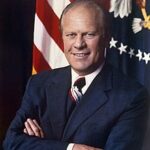The Ford Vietnam Draft Clemency Decision
President Gerald Ford announced the Ford Vietnam Draft Clemency program on September 16, 1974. The initiative offered conditional clemency to draft dodgers and military deserters from the Vietnam War. Ford required alternative service rather than providing unconditional amnesty. The program lasted 18 months and addressed roughly 350,000 cases. ⚠️ Ford’s approach immediately sparked fierce criticism from opposing political factions.
Program Requirements and Conditions
Draft evaders had to perform up to two years of public service work. Military deserters faced case-by-case review by clemency boards. Participants received clemency certificates instead of presidential pardons. The program excluded convicted war resisters already serving prison sentences. 📊 Only 22,500 people ultimately participated in Ford’s conditional amnesty program.
Political Opposition from All Sides
Veterans’ organizations condemned the Ford Vietnam Draft Clemency program as too generous. Anti-war activists criticized the punitive conditions and limited scope. Conservative politicians argued Ford rewarded draft dodgers while patriots served. Liberal leaders demanded unconditional amnesty without service requirements. 🔥 The program satisfied virtually no major constituency in the deeply divided nation.
Impact:
Immediate Political Consequences
The Ford Vietnam Draft Clemency program generated bipartisan opposition in Congress. Republican hawks accused Ford of betraying military veterans and families. Democratic doves criticized the conditional nature as insufficient reconciliation. Ford’s approval ratings dropped among both conservative and liberal voters. 📉 The decision contributed to Ford’s image as an ineffective compromise leader.
Long-term Social Division
The program failed to heal Vietnam War divisions in American society. Many draft resisters remained in Canada rather than accept conditional terms. Veterans felt betrayed by any clemency offered to draft evaders. Anti-war activists continued demanding unconditional amnesty for all resisters. 🔥 Social tensions between pro-war and anti-war Americans persisted throughout the 1970s.
Historical Legacy and Lessons
Ford’s clemency program demonstrated the difficulty of post-war reconciliation efforts. The initiative highlighted deep ideological splits over Vietnam War policies. Historians view the program as well-intentioned but politically naive. The limited participation showed widespread rejection of Ford’s compromise approach. 🌍 The clemency controversy influenced future presidential decisions about military conflicts and national healing.
